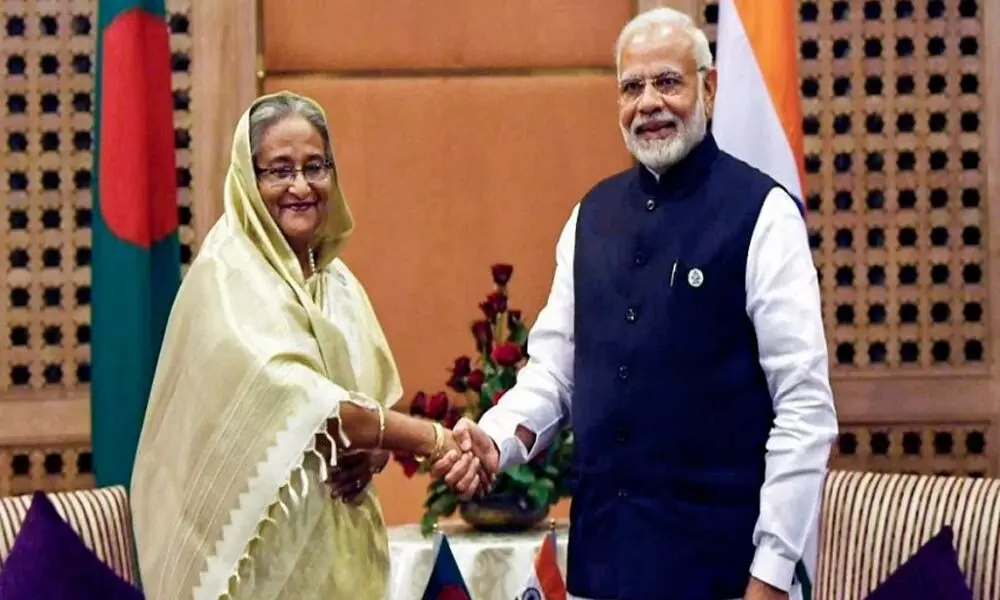Sheikh Hasina Sentenced to Death: Student Uprising Case Shakes Bangladesh
Sheikh Hasina found guilty in student protest crackdown. Death sentence issued; Dhaka sees unrest. Interim govt urges India to hand over Hasina.
image for illustrative purpose

The International Crimes Tribunal of Bangladesh (ICT-BD) found the removed Prime Minister Sheikh Hasina guilty of crimes against humanity in connection with last year’s protests led by students and sentenced her to death. Along with Hasina, the tribunal imposed a death sentence on the former home minister, Asaduzzaman Khan Kamal, while the ex-police chief, Chowdhury Abdullah Al-Mamun, admitted his guilt and was called a witness for the prosecution.
Subsequent to the verdict, the interim government of Bangladesh with Chief Adviser Muhammad Yunus at the helm, requested the Indian government to send back Hasina and Khan in accordance with the already existing treaty between the two countries. Hasina who left Bangladesh in August 2024 due to the protest’s intensification, is still in New Delhi.
Sheikh Hasina reacting to the judgement insisted that it was the case of political vendetta and that the tribunal was “rigged” and was installed by a non-elected administration having no democratic mandate. “I was not given a proper opportunity to protect myself,” she remarked, reiterating her willingness to appear before a proper tribunal where impartiality could be guaranteed regarding the weighing of evidence. Her party, the Awami League, declared a country-wide shutdown on Tuesday as a way of protesting the decision.
Unrest was widespread in the run-up to the verdict. The police reported about fifty cases of arson and several explosions from homemade bombs throughout the country in the last week alone, leading to two deaths. The police chief of Dhaka ordered to shoot on sight in the area to prevent attacks from taking place. In addition to that, prevention measures including deployment of security forces throughout the country were applied, along with the placing of paramilitary and police units in the major towns to keep peace.
The UN referred to the verdict as an “important step” for victims of last year’s violence but it was against the death penalty. UN Secretary-General Antonio Guterres and the High Commissioner for Human Rights underlined their opposition to capital punishment in all circumstances.
On the other hand, India took note of the tribunal’s ruling and reiterated its commitment to the welfare of the Bangladeshi people by taking peace, democracy, and stability in the neighboring country as its main concern.
The verdict led to reactions from political opponents and some public figures. Khaleda Zia, former Prime Minister, and leader of the Bangladesh Nationalist Party commended the tribunal’s decision. Author Taslima Nasreen condemned what she called the “double standards” of the interim administration.
According to interim leader Muhammad Yunus, the sentence was a manifestation that “no one, regardless of power, is above the law.” He also claimed the tribunal’s ruling was justice for the thousands affected during the 2024 student uprising, which led to at least 1,400 deaths according to UN estimates.
The protests started in July 2024 when the government reintroduced a controversial civil service quota system. Students demanded not just reforms of the quota but Hasina’s resignation too. The protests turned violent as police and protesters clashed, resulting in hundreds dead and injured. Hasina’s government was widely criticized for deploying deadly force against the protesters which eventually led her to flee to India where she was replaced by an interim government headed by Nobel Laureate Muhammad Yunus.
The judgment of the tribunal has finally come to a close after several months of scrutinizing various allegations, such as the organizing of synchronized assaults, the giving of incitement orders, and the allowance of deadly force that resulted in the loss of numerous innocent lives.
The capital punishment of Hasina will be executed at her capture. Bangladesh's transitional administration has been vocal about the intention to carry out the sentence completely, while Hasina still remains in India. At the same time, the Awami League has promised to challenge the ruling through political means, which hints at possible disturbances before the elections that are planned for February 2026.

